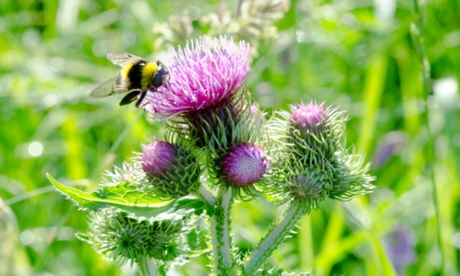
Dave Goulson is a professorial bee man (at the University of Sussex, he is the queen of the Goulson Lab) but he is also very good at writing accessibly about his study systems. His book about bumblebees, A Sting in the Tale (2013), is among the brightest things in the recent flowering of composite works of nature writing, natural history and memoir.
The material gathered in A Buzz in the Meadow draws on the first book and richly (and darkly) extends it. It is really a series of essays on, first, the lives of some insects Goulson has known; second, the interrelationships of plants and some of their insect pollinators; and last, three polemics on the coming end of the world, as it seems to Goulson, including most blackly, the urgent news of his own work on neonicotinoids, the insecticides that are killing the world’s bees as well as much too much else.
All these observations and reports are nicely articulated by an exoskeleton or account of the insect natural history of the old farm and the surrounding 33 acres of land in Charente in France where Goulson and his family have had a holiday home since 2003. He turns this patch, its terroir, into his plot and builds his stories out of it. Chez Nauche has also become a field site for his students and his own entomological studies. Literally so – much of his efforts there have been to encourage a one-time arable field back to its earlier life as a meadow.
Goulson is good here, as throughout, on how everything still speaks to everything else in nature, how, while we might (contra John Donne) be an islanded species (and behaving collectively as if no other has a valid passport or could be truly comprehensible), the world outside (and sometimes in – there is a good chapter here on deathwatch beetles) still works as a kind of vast natural shout-out or chorus. This is what ecology is all about, the real buzz in the meadow, and if we know how to listen, that is also the buzz we might get from a meadow.
There seems a rule, and Goulson’s book bears this out, that the further biologists travel from Homo sapiens as a professional concern, the easier-going and more ego-free members of the species they are likely to be themselves. There are not many prima donnas in tardigrade studies. Nor are entomologists made anxious about the human implications of their findings in the way that vexes, say, primatologists. Discoveries in the sex lives of insects go beyond any website content you could ever legally access. Many will have heard of the male mantis eaten in flagrante by his partner, few will know (and few could know without needing some sort of counselling) of the male African bat bug whose penis is built like his mouth and is used to stab-penetrate his bride several times over in any part of her body.
Goulson’s chapter on the housefly is a brilliant account of the ghastly mess we have made of our mess and why it is fly heaven. And there is a bigger and still nastier story dominating the second half of his book: the unfinished business relating to the harm that agricultural insecticides are causing bees. Goulson has been at the centre of academic work on this and his chapter here has very tough news and is properly terrifying to read. Keep the image in your mind of the children of Chinese fruit growers being sent to climb trees to hand-pollinate their orchards because there are no bees left to do the job. There are about one million known species of insect. They amount to 10 million trillion individuals. The thought of their going is perhaps even harder for us to contemplate than our own exit. Rarity is not something we think of for flies or ants. Cockroaches are supposed to be apocalypse-proof. But if mankind were to disappear, EO Wilson, king of the ants, and a hero of Goulson’s, has said, the world would regenerate back to its pre-human state without problems; if insects vanish, the same world, with or without people, would collapse into chaos.
Tim Dee is the author of Four Fields and The Running Sky. A Buzz in the Meadow is published by Jonathan Cape (£16.99). Click here to buy it for £14.99 with free UK p&p

